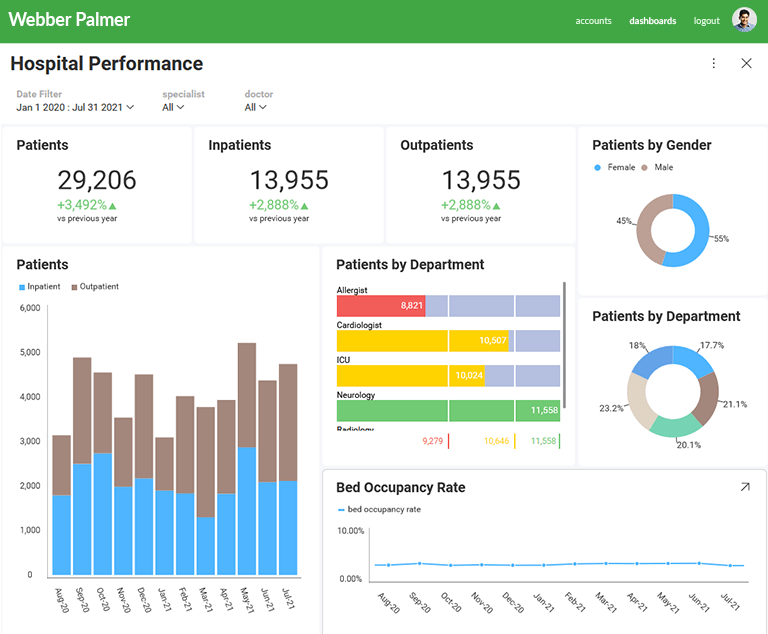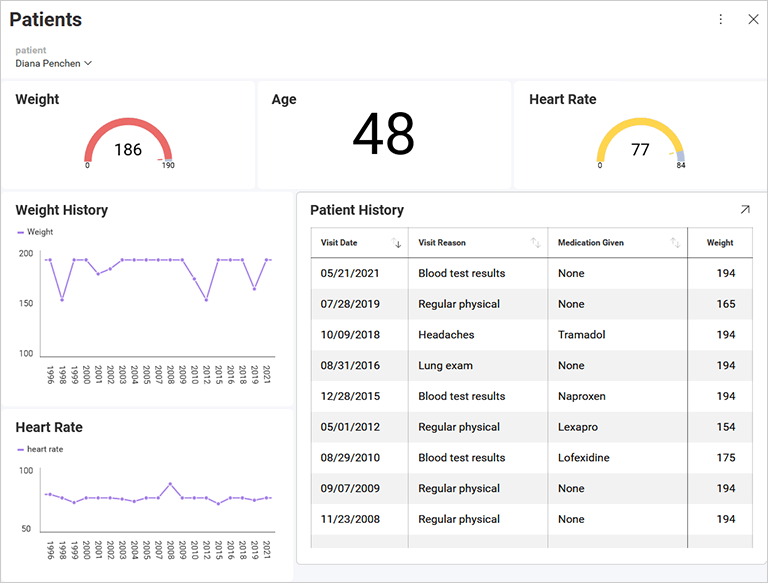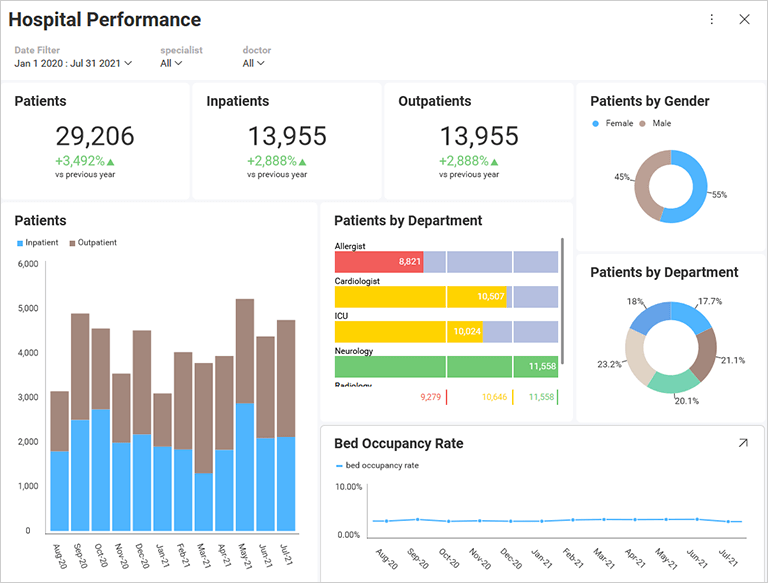
Embedded Analytics for Healthcare
Data analytics has become essential in many industries including healthcare. As the average human lifespan increases along with the global population, data analytics arise in the healthcare industry to make a difference: improve patient care; predict disease outbreaks; reduce the cost of treatment, and so much more. At a business level, with the help of analytics, healthcare organizations can simplify internal operations, polish the utilization of their resources, and improve care teams’ coordination and efficiency.
Watch a Demo BOOK A PERSONALIZED DEMO Request a Demo FREE TRIAL

The Importance of Embedded Analytics for Healthcare
Real time, accurate insights that can impact the patient are extremely important. Using embedded analytics at the point of care helps healthcare organizations, hospitals and doctors provide the right healthcare to patients at the right time. Embedded healthcare analytics allows healthcare professionals to access, analyze and process patient data in order to deliver data-based quality care, accurate diagnosis and personalized treatments.
4 Key Benefits Embedded Analytics Provides Healthcare
Better decision making = improved patient care
The largest benefit that data analytics brings to the healthcare industry is the accessibility to medical history, comorbidities, demographical and economic data. All this data gives medical professionals valuable insights that improve their decisions and lead to overall improved patient care. They can more accurately diagnose patients and undertake better treatments tailored to the patient’s unique health situation. Furthermore, healthcare analytics can predict which patients are at higher risk and start early innervations so deeper problems can be avoided.
Health tracking and digitalization
The digitalization of health services completely reshapes how patients and health professionals interact with each other, how data is shared with health providers, and how decisions about treatments and health outcomes are taken. Nowadays, we can attach devices to our bodies tracking our health and body performance at any time. For example, diabetics can monitor the rise in blood sugar at any given moment without the need of finger pricks.
Preventing human errors
Human errors in healthcare could be fatal. Thankfully, data can help flag potential errors and avoid mistakes by providing real time, accurate insights that can guide medical professionals’ actions.
Reduces overall healthcare costs
Healthcare providers can use the data of patient’s electronic health records (EHRs) to identify patterns that lead to a better understanding of the patient’s overall health. This can cut costs for patients by reducing unnecessary care of hospitalization when it is not needed.
Healthcare Dashboard Samples
Healthcare dashboards are used to track and monitor patients’ metrics, diagnostic trends and more to gain deeper insights into people’s health and hospital performance.

Patient Health Monitoring Dashboard
Display key insights of patient overall health and track heart rate, blood pressure, temperature and other vital signs. This dashboard can display patients’ lab results and piece them in their overall health picture, including physical activity, quality of sleep and weight for example.

Hospital Performance Dashboard
The hospital dashboard provides insights into hospital staff and patient data. This dashboard can filter the data needed at the moment and display how many patients have been admitted, how many hospital beds are occupied, how many doctors are on duty and what is the ratio of doctors to patients at any given moment.
Frequently Asked Questions
What is embedded healthcare analytics?
Embedded healthcare analytics is the strategic integration of data analytics capabilities and interactive visualization tools directly into healthcare systems and processes. This integration equips healthcare professionals with the ability to identify opportunities for more effective and efficient operational and clinical decisions, predict trends, and manage the spread of diseases, thereby enhancing the overall healthcare outcomes.
What is healthcare analytics software?
Health analytics software refers to the application that helps healthcare organizations and professionals manage healthcare data and drive insights from it to improve the overall health quality and clinical outcomes.
What does healthcare data consist of?
Healthcare data is any data related to the health conditions of an individual or a group or population. This includes a record of healthcare services received, and conditions and clinical outcomes of those services.
What are the sources of healthcare data?
Healthcare data is being collected when people interact with administrative and medical records, vital records, surveys, disease registries, claims data, and EHRs.
Who in the healthcare industry can use embedded analytics?
Anyone who is involved in the healthcare industry, in one way or another—healthcare organizations, doctors, hospitals, pharmacies, pharmaceutical companies, physicians, psychologists, and every other healthcare stakeholder.
How can Reveal embedded analytics solution help organizations in the healthcare industry?
Reveal empowers healthcare organizations by providing real-time, accurate insights at the point of care. It enables medical professionals to access, analyze, and process patient data, leading to improved decision-making, personalized treatments, and better patient care. Additionally, Reveal helps reduce overall healthcare costs by leveraging data analytics to identify patterns and optimize resource utilization. Read the story of Scriptly, Reveal’s client in the healthcare industry, to see a real-life example of what Reval could do.


